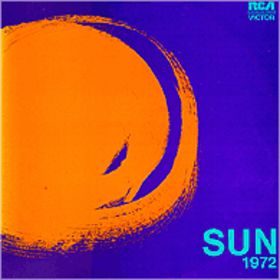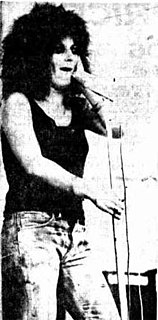Related Research Articles
The Dingoes are an Australian country rock band. They were initially active from 1973 to 1979, and reformed in 2009. Initially based in Melbourne, the band relocated to the United States from 1976. The most stable line-up comprised John Bois on bass guitar, John Lee on drums, Broderick Smith on vocals and harmonica, Chris Stockley on guitar, and Kerryn Tolhurst on guitar. Mal Logan on keyboards joined after Stockley was hospitalised when shot in the stomach by Melbourne drug-dealer, Dennis Allen, who was attempting to gate crash a party. The Dingoes' debut single, "Way Out West", was released in November 1973, and peaked in the top 40 of the Australian Kent Music Report singles chart. Subsequent singles were "Boy on the Run", "Smooth Sailing", and "Into the Night", which did not reach the top 50. They had three top 40 albums, The Dingoes in 1974, Five Times the Sun in 1977, and Orphans of the Storm in 1979.
The Johnnys are an Australian pub rock band from Sydney forming in 1982 and still active today that combines country and punk musical styles. Members are Graham Hood, Billy Pommer Jr and Slim Doherty and have included founder, Roddy Ray'da and Spencer P. Jones.
Zoot were a pop rock band formed in Adelaide, South Australia in 1964 as Down the Line. They changed their name to Zoot in 1967 and by 1968 had relocated to Melbourne. They had a top five hit on the Go-Set national singles chart with a heavy rock cover of The Beatles' ballad "Eleanor Rigby" released in 1970; but they disbanded in May 1971.
Timberyard Records was a pioneering record label in the Australian independent music movement of the 1980s.
Procession were an Australian psychedelic pop, jazz band, formed in October 1967 by Craig Collinge on drums, Trevor Griffin on organ, Brian Peacock on bass guitar and vocals, Mick Rogers on lead guitar and lead vocals. They relocated to London in mid-1968 and released a self-titled studio album in the following year. Australian singer-songwriter, Ross Wilson took over on lead vocals in April 1969 but the group disbanded in September. Rogers later joined Manfred Mann's Earth Band, Collinge was later a member of British proto-punk band, Third World War, and briefly played drums in the notorious "fake" Fleetwood Mac in 1973. Wilson was later a member of Daddy Cool and a record producer, he was inducted into the ARIA Hall of Fame as a solo artist in 1989 and as a member of Daddy Cool in 2006.
Company Caine, also styled as Co. Caine and Company Kane, were an Australian progressive rock band. They were formed in March 1970 by Ray Arnott on drums, Cliff Edwards on bass guitar (ex-Cam-Pact), Jeremy Noone on saxophone and keyboards, Gulliver Smith on lead vocals and Russell Smith on guitar and vocals (ex-Cam-Pact).
Raymond "Big Daddy" Walter Arnott is an Australian rock drummer, singer-songwriter, he was a member of Spectrum (1970–1973), which had a number one hit with "I'll Be Gone" in January 1971. He also had short stints with The Dingoes in the 1970s and Cold Chisel in 1980s.
Robert George Porter was an Australian country, pop-rock musician, producer and record label owner.

Sun 1972 is the sole album by Australian progressive jazz-rock group, Sun. It was released in August 1972 with Horst Liepolt producing for RCA Victor. Australian musicologist, Ian McFarlane, opined that it is a, "collectable, progressive jazz-rock album." Australian singer, Renée Geyer, was a member of the group for this recording and later had a solo career.
Mississippi were an Australian soft rock band (1972–1975), which included Graham Goble on lead vocals and guitar, Beeb Birtles on lead vocals and guitar, and Derek Pellicci on drums. The band had started as Allison Gros in Adelaide in 1970 and moved to Melbourne in 1971 where they recorded as Allison Gros, Drummond and, early in 1972, became Mississippi. As Drummond they issued a cover version of "Daddy Cool", which peaked at No. 1 on the Go-Set National Top 40 for eight weeks. As Mississippi they reached No. 10 with "Kings of the World". In early 1975, with Birtles, Goble and Pellici aboard and the addition of Glenn Shorrock, the group were renamed, Little River Band.

Jesus Christ Superstar or Jesus Christ Superstar – Original Australian Cast Recording is an album released in late 1972 on MCA Records. Jesus Christ Superstar is a rock opera created by Tim Rice and Andrew Lloyd Webber in 1970. The earliest Australian version was staged from May 1972 to February 1974. This album features Trevor White, Jon English and Michele Fawdon. Together with other cast members, they performed vocals for a studio recording. It was produced by Patrick Flynn, the show's musical director and a conductor for Opera Australia. The album peaked at No. 17 on the Go-Set Albums Chart in June 1973, while it reached No. 13 on the Kent Music Report and remained on its charts for 54 weeks. It appeared in the top 100 on the 1974 End of Year Albums Chart. In May 1973, the album was awarded a gold record for sales of 50,000 albums.

Wendy June Saddington, also known as Gandharvika Dasi, was an Australian blues, soul and jazz singer, and was in the bands Chain, Copperwine and the Wendy Saddington Band. She wrote for teen pop newspaper Go-Set from September 1969 to September 1970 as an agony aunt in her weekly "Takes Care of Business" column, and as a feature writer. Saddington had Top 30 chart success with her 1972 solo single "Looking Through a Window", which was written and produced by Billy Thorpe and Warren Morgan of the Aztecs. After adopting Krishna Consciousness in the 1970s she took the name Gandharvika Dasi. In March 2013 she was diagnosed with oesophageal cancer, and died on 21 June, aged 63.
Headband were a progressive, blues rock band formed in Adelaide in February 1971 by bass guitarist Chris Bailey; drummer Joff Bateman; singer-songwriter and keyboardist Peter Beagley ; and singer-songwriter and guitarist Mauri Berg. The group supported Elton John, The Rolling Stones at their Sydney performances. The band finished third in the 1972 Hoadley's Battle of the Sounds – a national performance competition between the best groups representing each state. Headband released an album, A Song for Tooley and four singles before disbanding in 1974. Bailey later joined The Angels and then GANGgajang, Berg joined Fraternity and Head formed Mount Lofty Rangers and later went solo.
Bakery were an Australian progressive hard rock band formed in 1970 in Perth. The original line-up was Hank Davis on drums, Mal Logan on keyboards (ex-Rebels), Eddie McDonald on bass guitar (Avengers), Peter Walker on guitar and John Worrall on vocals and flute. They released two albums on Astor Records, Rock Mass for Love and Momento and had a Perth hit with "No Dying in the Dark". Bakery appeared at the Sunbury Pop Festival in January 1973 and disbanded in early 1975.
Cam-Pact was an Australian soul and psychedelic pop band which formed in April 1967. Originally they performed as The Camp Act but soon changed to Cam-Pact. Although little known outside Melbourne at the time, the various lineups of the group featured a number of young Melbourne musicians who went on to become significant figures on the Australian music scene, including Ray Arnott, Keith Glass, Chris Löfvén, Russell Smith, Robert Lloyd, and Chris Stockley. Cam-Pact issued five singles and three extended plays on Festival Records before disbanding in March 1970.

Flake were an Australian pop and rock group which formed in 1968. They released an album, How's Your Mother!, in December 1971 on the Violet's Holiday label, distributed by Festival. The group appeared on the Go-Set National Top 60 singles chart with cover versions of Bob Dylan's "This Wheel's on Fire", Marmalade's "Reflections of My Life", Vanda and Young's "Life is Getting Better" and Honeybus' "Under the Silent Tree". The group disbanded in 1974 but reunited in 1989 to support a compilation album, Reflections: The Festival File Volume Thirteen, before breaking up again in 1991.
G. Wayne Thomas is a New Zealand-born Australian based musician, producer and songwriter. His single "Open Up Your Heart"/"Morning of the Earth" reached #21 on the Australian Singles chart.
Peter Luscombe is an Australian drummer and composer.
Shane O'Mara is an Australian musician and record producer.
Galadriel were an Australian progressive rock group formed in 1969 by Garry Adams on guitar and vocals, Doug Bligh on drums, Gary Lothian on lead guitar, Mick Parker on bass guitar and flute, and John "Spider" Scholtens on lead vocals. According to Australian musicologist, Ian McFarlane, their debut self-titled album from May 1971 is, "one of the rarest major label progressive rock albums of the early 1970s... songs ranged in style from bluesy hard rock to jazzy ballads ." The group broke up in 1972. Galadriel was re-released in 1995, on CD, by Vicious Sloth Collectables.
References
- ↑ Poparchives - Go-Set Australian Charts, 15 January 1972. Retrieved 8 March 2013
- ↑ McFarlane, Ian (1999). "Encyclopedia entry for 'Rick Springfield'", Encyclopedia of Australian Rock and Pop (Allen & Unwin, Sydney, ISBN 1-86508-072-1)
- ↑ Ian McFarlane, "Healing Force", Encyclopedia of Australian Rock & Pop, (Allen & Unwin, Sydney, 1999, ISBN 1-86508-072-1)
- ↑ Hank B. Facer, "Sparmac Records Discography", Museum of Independent Record Labels